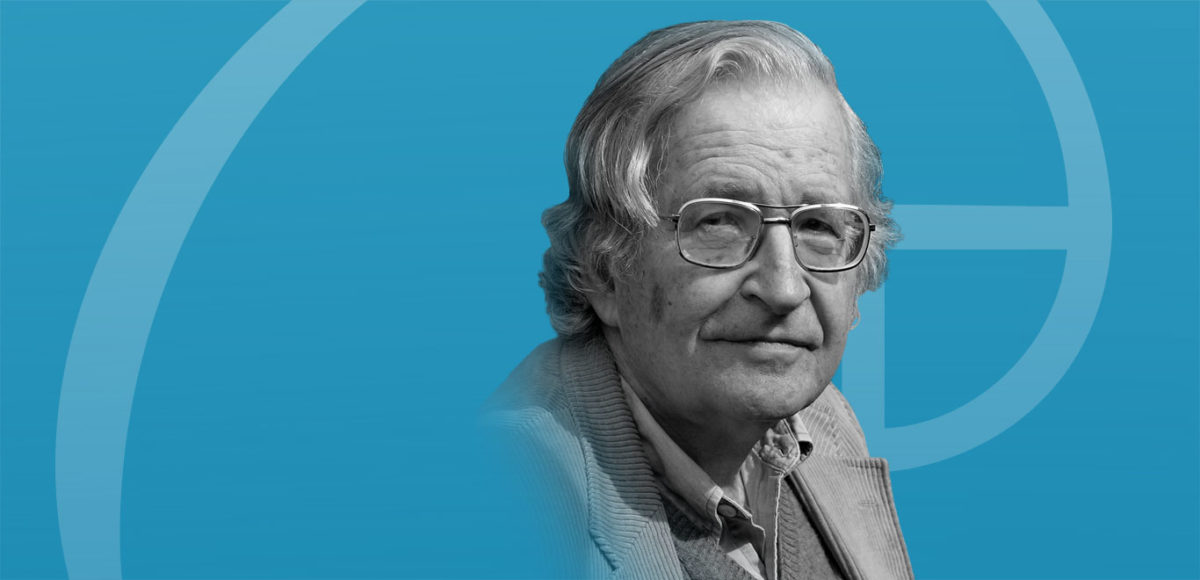Interview with Noam Chomsky
Alexander Görlach: Mr. Chomsky, you have spent a good part of your life advocating an America that is fundamentally different from the one that you live in now. What is most frustrating to you?
Noam Chomsky: One of the saddest things is that the death rate, for the first time in decades, is increasing in a particular part of the population: white, working class, working age, roughly 25 to 50 years old. That hasn’t happened since the great flu epidemic a century ago. And then we read in the papers every day that we live in a wonderfully functioning economy.
Alexander Görlach: What’s the reason for that?
Noam Chomsky: The last forty years were dominated by neoliberal principles, which was a stark departure from the previous period. Neoliberalism emphasises markets and disregards social needs and demands. Individuals, it argues, should be placed in a market, where they are asked to survive without social supports such as welfare systems, benefits, unions and other forms of associations. Over the last few years, the consequences became increasingly clear. It increased the power of those who already had it and who can now exploit it. Wealth is greatly concentrated, corporate power has greatly increased, and individuals have, generally, suffered.
Alexander Görlach: Where do you see the most dramatic reversals in the last few years?
Noam Chomsky: Probably with regards to climate change. The Environmental Protection Agency is removing regulations so that corporations can maximize profit. In fact, the United States is the only country that is increasing the use of fossil fuels except for us. Trump wants to further increase them while also cutting back on regulations for the automotive industry. The ones who suffer are our grandchildren who will inhabit an earth in which an organized society won’t be able to survive. That’s something we don’t discuss.
Alexander Görlach: Fairness and equality are two topics that have been at the heart of your work for decades. Over the years, what role has technology played in bringing about a more equal world?
Noam Chomsky: Unfortunately, inequality across the world is still rising. The rich inhabit a world in which they have no responsibility to their own countries. If you look at East Asia, which fifty years ago was as developed as most parts of sub-Saharan Africa, the role of technology in developing economies is obvious. They built their new wealth on the Japanese model – state directed development of technology, investments, and imports of capital goods from Europe. Compare that to Latin America. It has much richer resources and none of the foreign threats. Yet it hasn’t developed nearly in the same way. It maintains more of a colonial relationship with the colonial powers, increasingly with China. The imports into Latin America are luxury goods, and while in East Asia there are barriers against the export of capital, Latin America doesn’t have that.
The ones who suffer are our grandchildren who will inhabit an earth in which an organized society won’t be able to survive. That’s something we don’t discuss.
Alexander Görlach: Has technology lately become more of a hindrance to equality and participation? Does it further inhibit the ability of people to participate in the public spheres?
Noam Chomsky: Technology is neutral, it doesn’t care how you use it. A hammer doesn’t care whether you use it to build a house or crush somebody’s skull. That’s none of the hammer’s business. New technology is pretty much the same. You can use it, as China does, to impose an incredible system of surveillance and control over the population. Or you can use it to liberate people, give them the space to communicate and discuss how they want to organize their world. The way it tends to be used depends on whomever controls it. If it’s controlled by a big corporate or an autocratic state, it will be used for gaining extensive information to then sell that data to advertisers, or to control people.
Unfortunately, inequality across the world is still rising. The rich inhabit a world in which they have no responsibility to their own countries.
Alexander Görlach: But isn’t there a qualitative difference between something like a hammer, which is indeed neutral, and machine learning?
Noam Chomsky: First of all, we should appreciate that machine learning is a way to explore things within fixed domains. At the same time, there’s a lot of hype about it and a lot of people exaggerate the impact it can have. All the talk of superhuman machines that will control our lives is hot air. They are useful for certain things. Google Translate, for example, is a handy device that I use a lot. Its brute force, however, doesn’t tell you anything about human beings, cognition or how to bring about change.
Alexander Görlach: What change do you think is necessary, both in the United States and across the world?
Noam Chomsky: We accept the fact that people spend their lives under the tyranny of private enterprises. That isn’t a law of nature, it can be changed, and it should be. The way out of it is popular democracy. Democracy has suffered as power concentrates and grants more influence to the rich and powerful over the democratic system. We need to fully take control of the institutions of our societies and then changing those institutions in a way that is conducive to our lives. And to be perfectly honest, if you look across the globe right now, with protests in Chile, Venezuela, Hong Kong and elsewhere, that change is already happening.

 | Technology, AI and ethics.
| Technology, AI and ethics.

